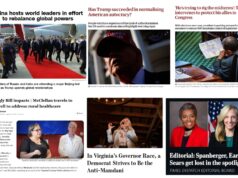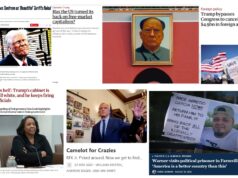by Cindy
Okay, I sort of understand the appeal of Andrew Yang. Some people, seeing Democrats and Republicans alternate control of the White House, and still not seeing some of America’s biggest problems—poverty, inequality, climate change, exorbitant health care costs—alleviated, think maybe what we need is to just shatter the traditional model of government, and try something new, some fresh ideas. (Heck, this is why many people claimed they were voting for Trump in 2016.) And Yang is full of innovative ideas.
But here’s where my issue with Yang comes in—the United States isn’t some startup company that can test out new “disruptive” ideas in an incubator. The lives of over 300 million Americans will be affected by the decisions of the next president, and most of them can’t afford to have the government trying out some half-cocked ideas that haven’t been tested or vetted (this is not to say these innovative ideas shouldn’t ever become policy, just that they need to be studied first when mistakes are costly).
Andrew Yang has spent much of his career doing just this—trying out new concepts and testing whether he can make them succeed. He’s had some that worked, and some that failed. Coming out of an Ivy League education at Brown and Columbia Law, the son of two Taiwan-born US scientists, he lasted merely five months in corporate law before realizing that it wasn’t what he wanted to do with his life. He went on to tinker with a start-up company called Stargiving that connected celebrities with charitable causes. It was out of business two years later, with Yang saying “even though Stargiving bombed, it was still a very invigorating, energizing process.” He then tried a number of other jobs (a healthcare software company, a mobile content management company), finally finding enough success with Manhattan Prep—a graduate school test prep start-up his friend had founded, which Kaplan bought out—to pay off his own student loans.
In 2011, he started the nonprofit for which he is most well-known, Venture for America. Its admirable goal is to “revitalize American cities and communities through entrepreneurship,” by training recent college graduates from elite schools, and pairing them up with small start-ups in emerging cities (at far lower salaries than they could command elsewhere). Yang said he could create 100,000 jobs in such cities by 2025. And before he’d even placed a single fellow or created a single job, Obama named him a “Champion for Change” and a “Presidential Ambassador for Global Entrepreneurship” for his not-yet-begun efforts.
Venture for America has had some success—placing 40 fellows in cities like Cincinnati, Detroit, Las Vegas and Providence in 2012, and expanding to around 700 total in various cities as of 2017, when Yang stepped down. Taking the most charitable measure of “jobs created,” the number of jobs partner companies have added since a fellow was placed, Venture for America has added 3,500 jobs to these cities—at a price tag of $4-$6 million per year, according to their financial reports. It’s safe to say that Venture for America is unlikely to meet Yang’s goal of 100,000 by 2025. What’s more, only a small fraction of the fellows have gone on to start their own businesses, and only about half even stayed in the cities they were placed in. One fellow explained it well:
“We all — especially that first year — went into it with a great amount of naivete about what we could accomplish,” said Billy Schrero, another fellow based in New Orleans who later struggled to start a company there before moving to Chicago. “We all went in with the best of intentions, and then we were met by some harsh realities.”
And that’s exactly it. It’s great for a young college grad to test things out if he can afford to, to see what works, to take an idea for how to make the world better and run with it and see whether it flops or succeeds. That’s the American way. But that testing and experimenting is part of the process—followed by figuring out whether ideas that work can be scaled up to the national level. Including the study or research of such ideas as part of a much more thorough presidential platform is reasonable; indicating a willingness to use the bully pulpit to support efforts to promote these ideas is sensible. In Yang’s case though, these are the centerpiece of his campaign, his raison d’être.
Yang’s main policy is a universal basic income, which he calls the “Freedom Dividend.” It’s one of the simplest concepts—every adult citizen, regardless of income or work status, would receive a $1,000-per-month check from the government. Sounds great, right? Except…that’s $3.9 trillion a year, close to the current total expenditures of the entire federal government. Aside from the cost, i’s hard to tell whether this is a great idea or not, because it’s only been tried in a very small handful of places, often with different specifics than what Yang is proposing. Iran initiated something very similar with some success, as a way of replacing food and electricity subsidy programs that distribute national oil wealth. Finland is one of the most well-known tests of UBI, but only those unemployed received the payments—the program was ended, and results do not indicate that it increased employment as intended. Otherwise, UBI is something mainly being studied in Northern California university research labs, and not even close to something that we would commit to enacting federally.
Here are some questions we don’t yet have answers to about UBI: how would people’s work behavior—employment, hours, self-employment—change in response to a basic income; how would migration from state to state, and immigration to the US from other countries change; how would family-size decisions change; how would personal saving, spending and budget priorities change; and perhaps most important of all, how would the government pay for such a program? Given the current tax structure of the US, would a universal basic income result in Middle Class families subsidizing the universal basic income payments to the wealthy?
Of course, this isn’t Yang’s only policy idea. In addition to the Freedom Dividend, he lists two other “big policies” on his website, one of which is “human centered capitalism.” His description sounds like a very noble notion, one that I don’t really disagree with at all. But in terms of actual practices, he’s only listed collecting some new government statistics that measure outcomes in better terms, and appointing highly-paid regulators who are prohibited from future private industry work. His other “big policy” is Medicare-for-All. The problem here is that, whereas other candidates have explained in great detail how their Medicare-for-All plan or transition to universal coverage would work, Yang’s plan lists just three bullet points:
- Work with Congress to create a Medicare-for-All system to provide healthcare to all Americans.
- Shift the way doctors are compensated to promote holistic and empathic care.
- Create incentives for and invest in innovative treatment methods and methodologies.
That’s it. No further details. And while I argued here that Elizabeth Warren may have tripped herself up by having too many plans, with too much detail, this other extreme is certainly not better.
Elsewhere on his website, you’ll find somewhat of a hodgepodge of policy ideas, from the American Mall Act to revitalize abandoned malls, directing the FAA to address airline overbooking, changing the chain of command for nuclear launch decisions, eliminating the penny, and many others. There are some good ideas in there and some that have me scratching my head.
At the end of the day, I’m so glad America has people like Andrew Yang who are full of bright, innovative ideas, as well as the passion and drive to make the country better. But we are in a crisis right now, with our democracy hanging by a thread (not to be melodramatic), and we simply can’t afford someone to learn on the job about the “harsh realities” of the way the US government works. We can’t afford to be an incubator for totally untested ideas; at this point in time, “bombing” simply isn’t an option.



![Monday News: Trump’s Lunacy Pushes China, Russia, India, etc. Together; “Happy Labor Day. Donald Trump and Elon Musk Are Screwing Workers.”; “Where is the [media’s] intense focus on Trump’s failing health?”; ““Trump says he is not a dictator. Isn’t he?”](https://bluevirginia.us/wp-content/uploads/2025/09/montage0901-238x178.jpg)










![Monday News: Trump’s Lunacy Pushes China, Russia, India, etc. Together; “Happy Labor Day. Donald Trump and Elon Musk Are Screwing Workers.”; “Where is the [media’s] intense focus on Trump’s failing health?”; ““Trump says he is not a dictator. Isn’t he?”](https://bluevirginia.us/wp-content/uploads/2025/09/montage0901-100x75.jpg)